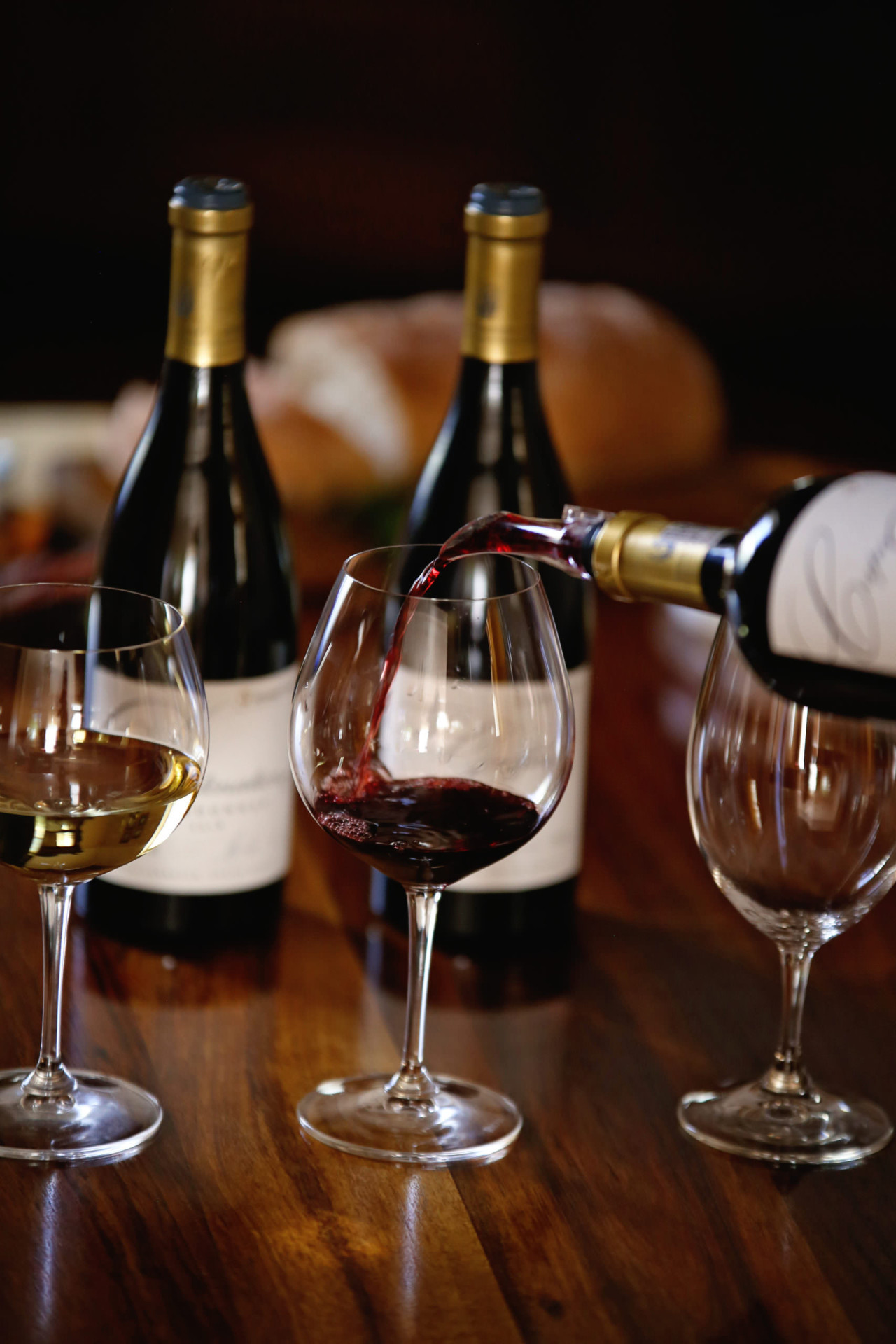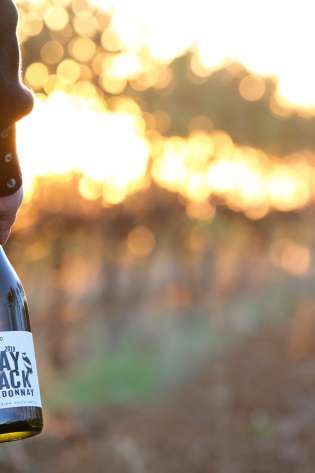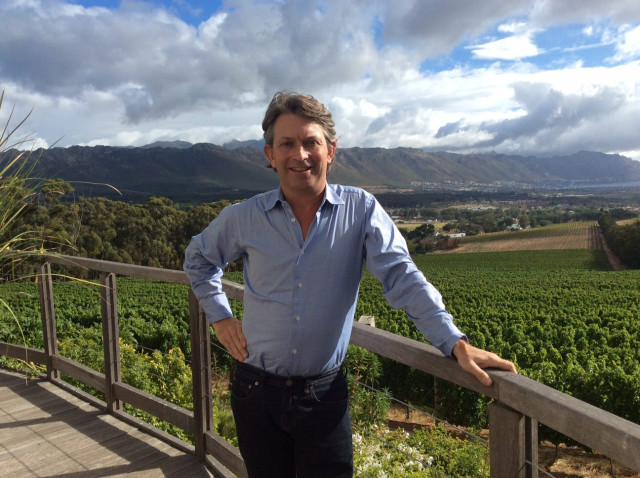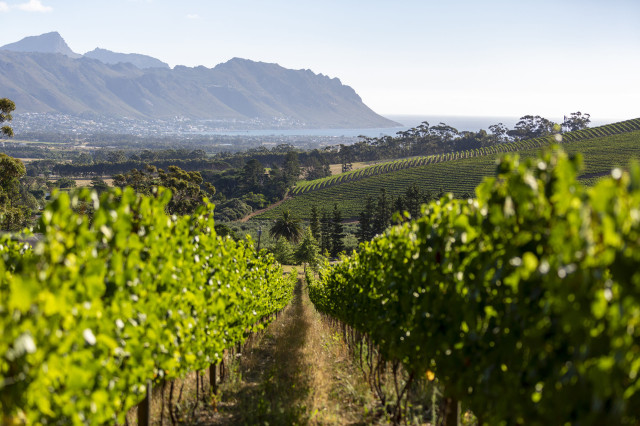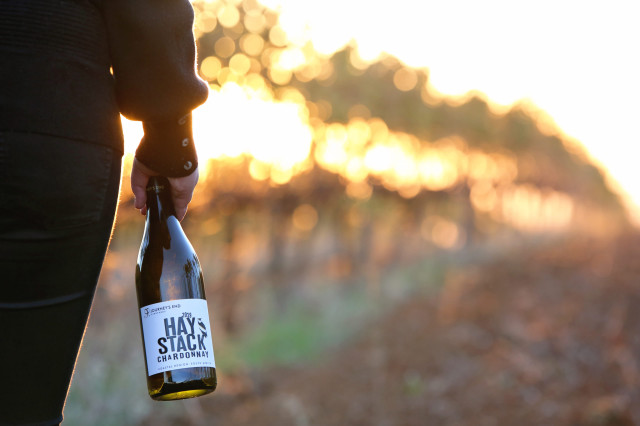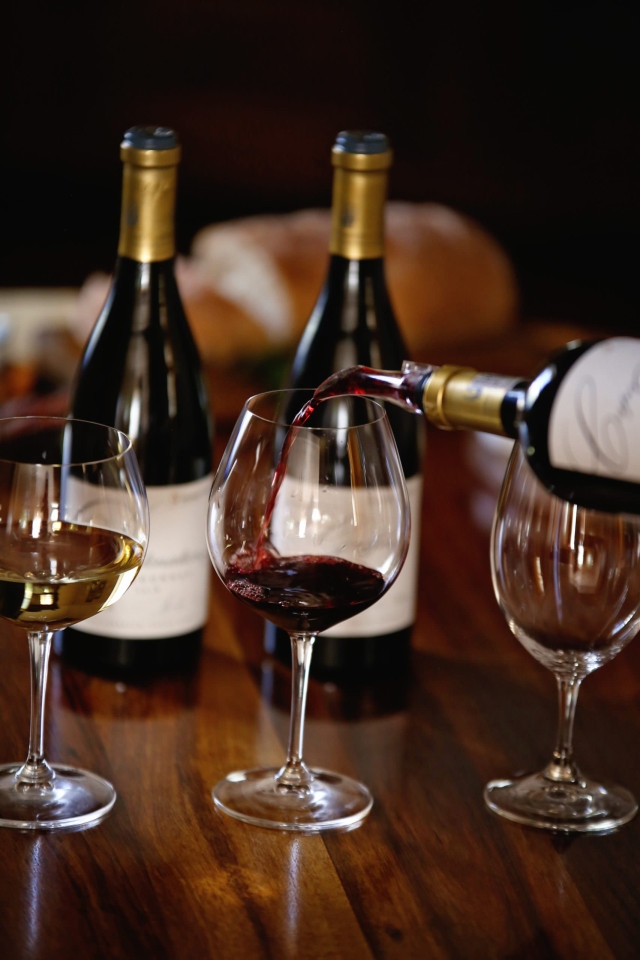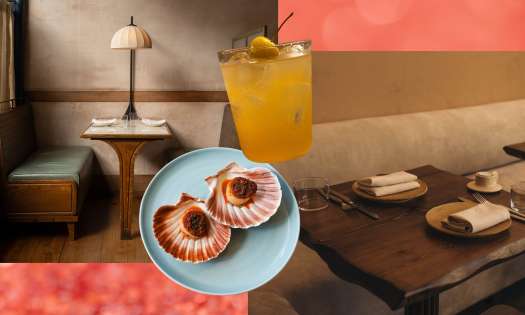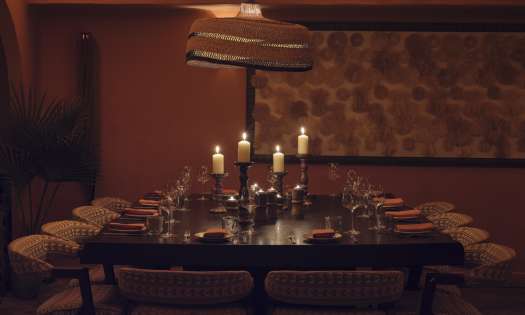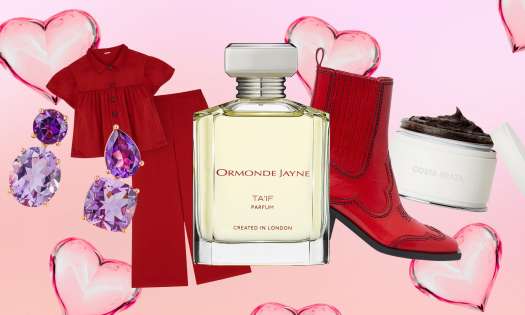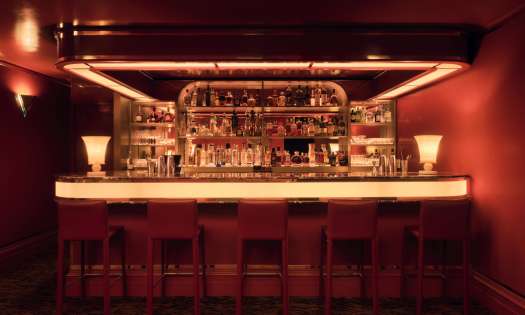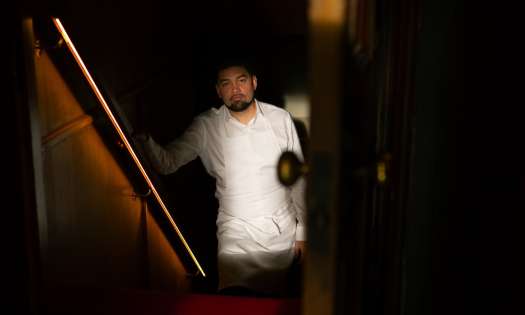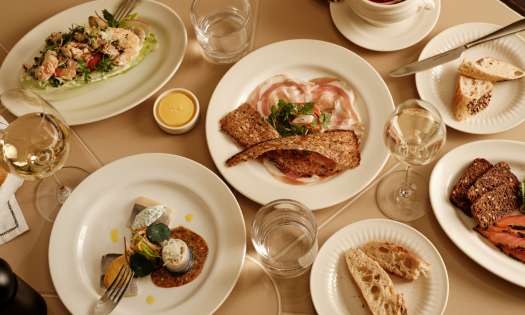Seeing a premium South African wine on the wine list at a London restaurant may not seem unusual now, but this wasn’t always the case.
“One of the challenges we had was the perception that South Africa was a high volume, grocery, mid-tier producer. Not premium,” explains Rollo Gabb, managing director of Journey’s End Wines.
Journey’s End is an award-winning winery and family-owned company with a portfolio that includes Journey’s End Vineyards, Mount Rozier, Identity, and Gabb Family Vineyards. Sustainability and producing premium wines ethically are at the core of their business. Gabb proudly shares that they converted to solar power in 2014, became Fairtrade-certified in 2017, and were awarded “Ethical Company of the Year” by The Drinks Business Green Awards last year. Though the past couple of years posed a range of challenges for the business, it was the effect the pandemic had on the local community that spurred the team to take action. Gabb talks passionately about the Journey’s End Foundation, an initiative they launched last year, and how it has always been part of the company’s DNA to provide and care for the land and the people within the wider community.
On stepping up to the plate at the beginning stages of their venture, Gabb was always confident that the quality of their product would shine through. “We really came in trying to drive the premium messaging with Journey’s End in 2007. South Africa is producing a significant amount of very, very premium wines and the world is beginning to recognise it,” he shares. Over the summer, our lifestyle expert spoke with Gabb about breaking into new markets, pairing wines with summer dishes, and his favourite restaurants in the Western Cape.
As you are originally from the U.K., what were some of the opportunities and challenges you saw launching a business in South Africa?
There’s been a number of different opportunities and challenges that have come up on this journey that we’re on. First, with our family entering South Africa when Mandela came into power in ’94 after apartheid, we saw a big opportunity for South African wine in the UK. For my part in Journey’s End specifically, that I launched in 2007, the opportunity was that premium and super premium South African wines weren’t really recognised in the UK. South Africa was making amazing, super premium wines but they weren’t being exported or were that well known in the UK. We also have a fantastic bit of land in Stellenbosch, some of the most prestigious land on the Western Cape. But the challenges were initially the perception of South Africa not being a producer of premium wines and the premium category being so small in the UK. I started off in 2007 door-to-door hand-selling wines to individual restaurants where there’d be one or two South African wines on their wine lists and they probably thought I was a bit mad! 2008 saw the credit crunch with lots of restaurants in a bit of stress and the idea of taking on an unknown premium producer from a country that was not known for premium wines was very, very difficult.
You have a number of brands within your portfolio. Could you tell me more about how your business has evolved over the years?
We have a broad portfolio and our business is global. We are highly specialised wine producers in South Africa and we have a broad portfolio that deals with different palates, age groups, and demographics.
We’ve got a super premium end, which is where we started with Journey’s End, which is our family’s estate by the Schapenberg hills overlooking False Bay. We’ve got wonderful vineyards touched by breezes coming off the ocean in front of us and Journey’s End is really the pinnacle of what we do. That brand I started in 2007 with four wines from four single-vineyard blocks: a Chardonnay, a Shiraz, a Merlot, and a Cabernet. We’ve now evolved to have 14 wines in the range and I’ve planted new vineyard blocks as well. In the past 15-20 years, we, as a family, bought more land, and the brand is performing well and experiencing strong growth internationally. We can now be found in 32 countries around the world.
Then we have Mount Rozier, which is more volume-focussed. The Mount Rozier estate we bought in 2010 and it’s becoming a big success across Asia. In the UK, we’re a little more grocery-focussed and also partnering with online businesses. Mount Rozier’s doing very well, and the focus of course is one of conservation. We have a big conservation programme on the Mount Rozier estate—amazing wildlife, birdlife, very intense sustainable farming practices, and it’s a beautiful little paradise.
Identity by Journey’s End is more fruit-driven, targeting younger consumers with Augmented Reality labels, more fruits, more funkiness. Gabb Family Vineyards is the brand focussed on specialist retail, working with vine fruits and neighbouring vineyards and working closely with retailers like Majestic and on-trade customers like the Ivy Group. It’s a pretty complex science going on, but we like to think we’re making wines to suit as many profiles as possible and being very specific about each one of those products.
Why was it important for you to run a sustainable and ethical business?
From day one we really strived to be a force for good. So since ’94, a lot has changed in the world—being a force for good in’ 94 is different from today. The requirements and urgencies out there do change, but one thing is consistent and it’s about farming and sustainable farming practices. We’ve always been very keen on conservation, looking after the land, wildlife, and having a beautiful farm that champions all of those things.
It’s extraordinary what we have going on, but we also look at energy and the evolvement of technology. We’re solar-powered; we were, I think, the second wine farm in South Africa to convert to solar. We took the opportunity as soon as we could, then converted to Fairtrade. It was more about rubber stamping what we were already doing. As a business, we go way beyond the criteria that Fairtrade requires—from workers’ pay to how we look after our team and operate as a fair business.
Tell me more about the Journey’s End Foundation and how its mission ties into that of your business.
I think the biggest step we took in terms of being a sustainable and ethical business was when we launched the Journey’s End Foundation off the back of the covid pandemic. I was sitting in the UK in July last year, unable to get to South Africa, and realised South Africa was in a very difficult spot—not just from our own business perspective where we had massive alcohol bans across the country for close to 6 months, but a lot of other businesses were really hurting. We launched the Journey’s End Foundation really to tackle immediate poverty and hunger because we felt the most pressing issue in South Africa was starvation—no tourism, no restaurants open, no hospitality, wineries had problems, farms had issues, unemployment was skyrocketing, and there was little to no government support. So we launched the Journey’s End Foundation to produce, initially, 8,000 meals a week for the local community. We’ve now done over a million meals!
If we entered your home right at this moment, which bottle would we find you drinking from?
Right at this moment, you’d find me drinking my brand new, just labelled Journey’s End MCC Brut, which is our first ever sparkling that we’ve done. Made in the Champagne method, Methodé Cap Classique, 18 months of maturation, and a really fantastic little fizz we’re going to be launching in the UK later in the year.
You have friends over for a late summer meal. What’s on the menu and which wines are you pairing with each dish?
I’d kick off with a little starter, maybe a nice little red pepper sliced in half with a couple of cherry tomatoes and in there and a salted anchovy. I’d stick it under the grill and let it cool down. And with that I’d probably slush away at our Journey’s End Wild Child Rosé if the sun was out, which is a beautiful very delicate grenache rosé with a nice little bit of acidity, but some nice strawberries and cream, a really fruity little number. For my main course, assuming we’re still going to touch some summer weather, I’ll make the most of my little Green Egg in the garden and chuck on a shoulder of lamb which I would have marinated and put in some courgettes brushed in olive oil and minted new potatoes. With a boozy crowd, I’ll be drinking my Huntsman, a lovely Shiraz Mourvedre Grenache, a really good, light, pretty fruity red. If it was a bit colder, I’d probably be diving in with our Cape Doctor, which is a top red, a 2016 Merlot Cabernet from a Malbec blend, which is absolutely beautiful—very elegant but pretty intense, so it depends on how much sun’s out. Then I think for the final course—I have a bit of a hang-up on gorgonzola at the moment—so maybe a green salad with some really nice, very ripe gorgonzola. With that I would bring out a little bit of straightforward Journey’s End Shiraz to finish off.
When people you know are visiting South Africa, what are the top restaurants and sites that you send them to?
I’m quite Western Cape-centric because that’s where we are and where the winelands are, and one of my favourite locals is a sushi restaurant called Blue Waters. For the cosy, ultra friendly, ultra fun long lunch or dinner, especially in the winter or autumn months with the roaring fires, it’d be Ken’s Forrester’s 96 Winery Road in Stellenbosch. It has really good homely cooking, just wonderful food. If I was really wanting to show off, we’d go straight to La Colombe in Constantia for the 4-hour lunch before heading down to Camps Bay for some shots at Caprice before heading into Long Street in the evening. Otherwise we love Chefs Warehouse as a restaurant—it’s spectacular and they’ve got a very cool little private dining experience on the cliffs. Final one to call out is Overture in Stellenbosch, which never fails to impress. Bertus Basson, the owner, has got another less formal one in central Stellenbosch called Spek and Bone as well.
